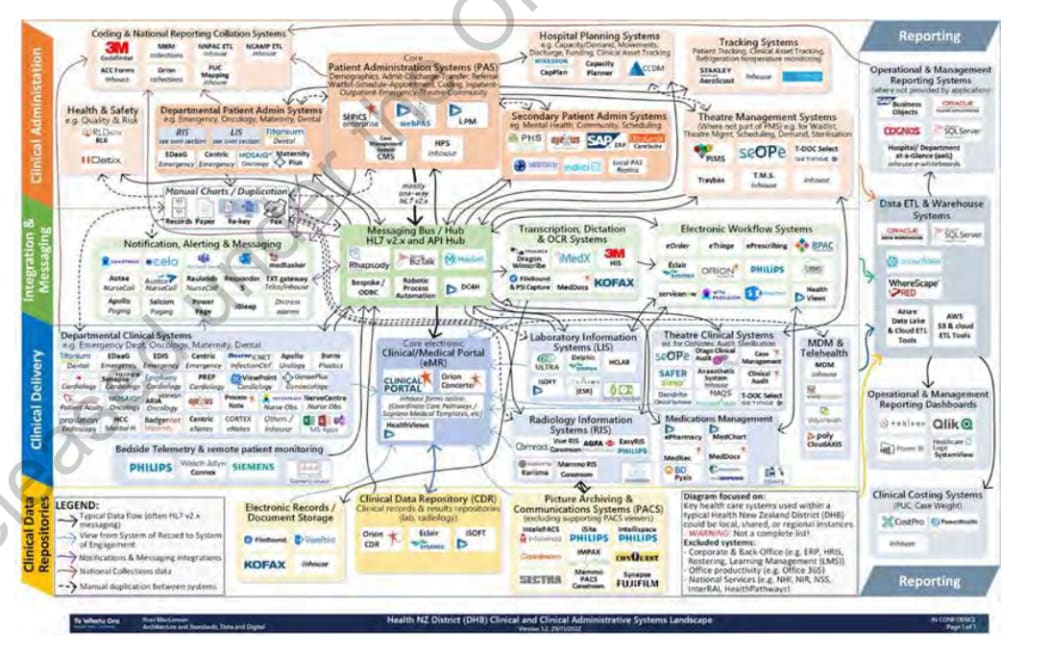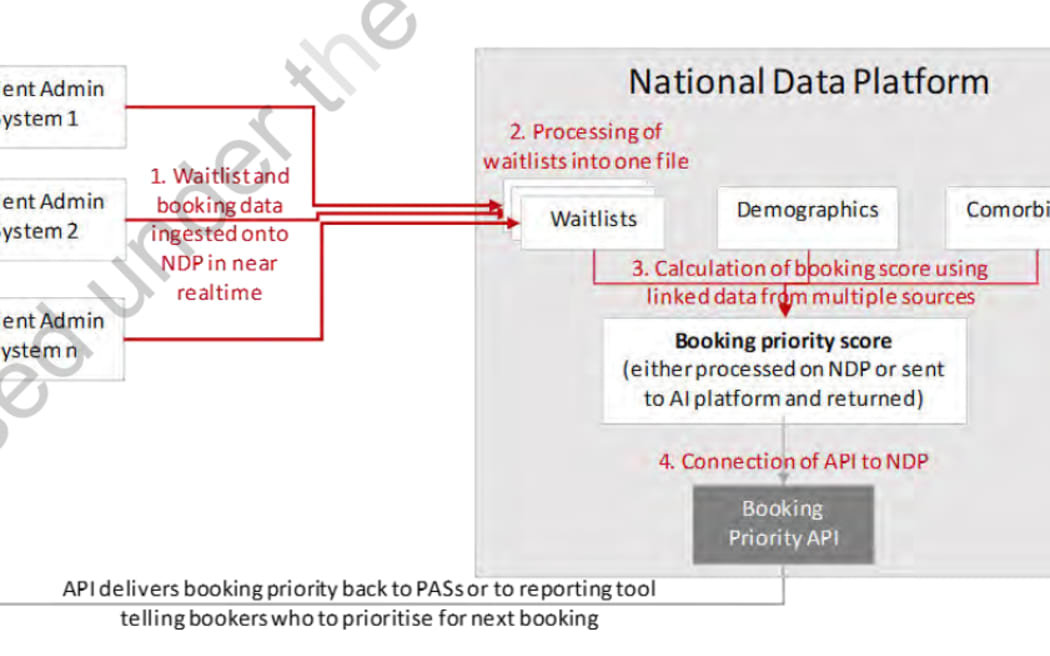
Photo: RNZ / Dom Thomas
Health officials offered to pay big tech firms thousands of dollars to run tests on dire hospital IT systems in the Wellington region.
The results helped Te Whatu Ora pick which company will overhaul the country's plethora of old, siloed, insecure systems.
The tests it offered to subsidise for $10,000 apiece in April focused on Wellington, because the region's hospitals are in most urgent need of data rescue, according to newly released reports.
In the end, it paid only the tender winner, Accenture. It was an investigation it would have had to commission anyway, and now it got to hold on to the results of it, Te Whatu Ora said on Tuesday.
Second on the urgency list are central Auckland's hospitals, and migrating its data over was also part of the paid test.
Locally, those two are most urgent, however, Te Whatu Ora said it changed its approach to bring the most important national datasets into the national data platform (NDP) first, with a timetable still to be worked out for the local ones.
Multinational Accenture emerged triumphant from among the five companies shortlisted in the bidding on a $23 million NDP, which has been under development since July.
The NDP is being hailed for the benefits including:
- the solution to the country's imperilled health data systems;
- a way to make hospital booking scores fairer by prioritising medical treatment;
- an all-seeing eye to track both individual patients and entire population subgroups - for example, to spot patterns in the incidence of kidney or heart disease;
- a way to improve treatments
The tender and other documents, released to RNZ under the Official Information Act, describe high hopes for the platform.
The new platform will need to be able to take over, merge and make sense of petabytes of data, multiplying itself daily in 28 disparate, siloed health data warehouses, and processed by a motley, often ancient crew of hospital apps numbering in the thousands.
"In many cases, data is replicated multiple times," the bidders were told.
"In other areas, it is not available, which can result in gaps (in care pathways) and outcomes for them and whānau.
"We have limited national views or joined-up information, and labour-intensive data-sharing methods. This makes it hard to see our pressures in a way that enables us to make decisions quickly to marshal efforts and support."

The tangled web of health data that district hospitals currently struggle with. Photo: Te Whatu Ora
Within the 250 pages of released documents, cyber security is described as having been "ad hoc", with "no shared principles, standards", "limited and non-standard access", and "no ability to track data use to ensure it is being used for its intended purpose or adherence to sovereignty".
Enter the NDP
Enter the national data platform - the foundation for a $700m-plus overhaul of data and digital health underwritten by two government Budgets but suffering from very slow going.
"Initiatives we have underway, including a new national operating model and structures, and the roadmap to implement modern national solutions, start to address the barriers, but we acknowledge that sustained effort and focus is required over an extended period to digitally enable the desired models of care," Te Whatu Ora told the health minister in May.

The desired system to prioritise patient care under the NDP Photo: Te Whatu Ora
Apps were many - over 4000 nationwide - but skills were few; a "deficit of data and digital skills across the health ecosystem", it diagnosed.
The proposed model depends on powerful AI and algorithms within the NDP that:
- could track dialysis patients to boost the kidney transplant rate and lengthen the life of transplanted organs, and keep dialysis costs down
- could track the treatment of patients with heart disease - 39 percent of people currently had patchy records - "to discover imbalance and inequity"
- get new drugs into use faster, by identifying suitable candidates - and alerting doctors to them
- replace the existing "blunt tool" for booking priority, with one that gives doctors the steer within an hour and takes into account ethnicity, deprivation, remoteness of residence, and likelihood of deterioration.
One barrier is cost. The budget this financial year is $9.5m, with the cost over five years put at $23m.
However, the agency remains unsure just what it will take over time to hoover all the data into it - and make any existing systems talk to it, starting with some of the seven national datasets, such as for screening and mortality, then moving on to Wellington and Auckland's hospitals.
After that, it will cost even more to hoover all the data into it - and make any existing systems talk to it, starting with Wellington and Auckland's hospitals, before moving on to the seven national datasets such as for screening and mortality.
Next off the rank will be the databases from Te Aka Whai Ora (the Māori Health Authority), and Whaikaha (Ministry of Disabled People), followed by primary care organisations such as GP medical centres, then others - maybe even NGOs - who would get their own partitioned spots in the ever-expanding platform.
The OIA papers said it was about "showing value quickly", and keeping old systems running, as needed.
All this is in pursuit of the holy grail: lower running costs, and a unified, simpler, faster system.
Wellington and the Hutt Valley are the eyewatering case study that demonstrate an urgent need for such a system.
This is because the region's systems handle more than six million new patient records a month, and 25 million updates a month. They record "every bed movement, doctor change and health speciality change" - but in many cases are so slow and small they get jammed, and are so out of date that IT companies no longer service them.
The scale of the entire project puts the $10,000 test subsidy in perspective. Both shortlisted bidders incurred additional costs to undertake this work "at their own expense", the health agency said.
The shortlisted companies used the tests to size and cost shift all the data.
The race was "very close" between the final two, but Accenture won the tender in early May.
The Dublin-based professional services firm said in June that "health is a key market for us in New Zealand" as the country was "rapidly digitising its healthcare services and products at both public and private sector".
On his LinkedIn profile, its New Zealand head, Dr Willy Reedy, calls himself a "technology evangelist" - his favourite app is reportedly a ring that tracks his pulse rate and other personal health data.
The multinational has until July 2024 to deliver the new platform, with help from local tech firm Acumen BI.
Only after the tender was awarded did Te Whatu Ora conduct a business case, using the same figures Accenture had come up with. It was approved in late June.
Whose data is it anyway?
Under the previous government's Cloud-First policy, data sovereignty has been the elephant in the room.
The national platform, however, was promising far better security.
But who controls the data?
Te Aka Whai Ora has said that consulting Māori was of utmost importance, and that the NDP should not go ahead before all the Iwi-Māori Partnership Boards are set up.
However only 15 boards were already active, with many others still in the process of being recognised - and the NDP was already being built.
Te Whatu Ora said it had consulted more than 70 stakeholders in hui about the NDP late last year.
However, by May, it had nine out of 10 plans and strategies around the health reforms in place - and the only one missing was the Māori data sovereignty framework.
The OIA documents said it looked likely the equivalent of billions of pages of data within the NDP would be handled in cloud-computing data centres in Australia.
Data warehousing and cloud services would come from leading US firms Snowflake and Amazon Web Services.
"When New Zealand regions of the chosen cloud service provider are available, we will look to migrate the services and data onshore. Backups to Australasian data centres may be appropriate, but we wish to avoid backups outside Australasia."




